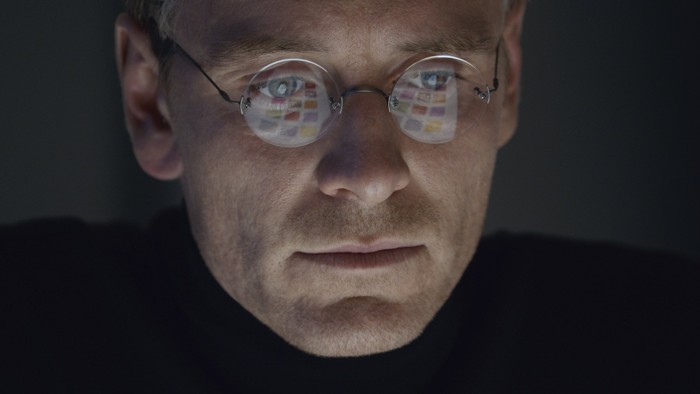Steve Jobs — film review

Roula Khalaf, Editor of the FT, selects her favourite stories in this weekly newsletter.
If God didn’t exist we’d have to invent him. Or maybe, last time round, he invented himself, taking the name Steve Jobs. According to the newest portrait of the late Apple founder and CEO, he invented himself three times — a trinity of epiphanies — and we get each relaunch.
There we were on Friday evening, a breathless band blandished to a New York multiplex for the first day of the first-week limited release (NY and LA only) of Steve Jobs the movie.
It’s the second movie actually: a 2013 Ashton Kutcher version sank with no survivors. Or even the third if you count Alex Gibney’s new nonfiction take in his documentary Steve Jobs: The Man in the Machine. This film crews itself with A-list artists — writer Aaron Social Network Sorkin, director Danny Boyle (Slumdog Millionaire, London Olympics), stars Michael Fassbender and Kate Winslet — and delivers on the grand scale. God is before us. God is around us. Gigabytes and soundbites are everywhere: the first, the stars of this creator’s technological zodiac, the second, the music of this self-publicist’s spheres.
But what an odd “grand scale” this is: not so much a movie, more a three-act play, even if it comes on like histrionic gangbusters. The three sections, each the backstage build-up to a launch, from the 1984 Mac to the 1988 “NeXT” computer to the 1998 iMac, remind us of the venerable crack about stage convention. (Was it Dr Johnson?) “If a play is set in the king’s bedroom everyone must have business in the king’s bedroom.”
Jobs, accordingly, must not just rant magisterially about de-wrinkling everything that might go wrong with his latest brain-baby’s public baptism: now pestering boffin Andy Hertzfeld (Michael Stuhlbarg) to ensure the new computer says “Hello” to the audience, now telling henchperson Joanna Hoffman (Kate Winslet) to “Get rid of the Exit signs”. (Too much light pollution.) He must also re-meet, behind the scenes at each geek gala, his daughter Lisa (three actresses, three different ages) whose conflicted place in his life must be either resolved or relinquished. Jobs first denied paternity; later acknowledged it. In the movie this is the human soap opera designed to soften — for non-geeks at least — all the hardcore tech hokum.
There’s a lot of that. But Fassbender makes it mostly bearable. He’s like a manic demigod spinning on a plinth. He’s a better Macbeth here — defiant, haunted, striving, tormented — than he was in Macbeth. Sometimes the frame cuts off the tall Fassbender forehead, leaving a lean, pale, jutting profile that looks like the Alien. It’s spooky, unnerving: the Danny Boyle of Frankenstein.
Everyone seems to come to Jobs, even though Jobs often goes to them. That’s the magic of a leader. The camera barely stops moving, room to room, space to space, and the colour style evolves no less ineluctably. We start with warmish greens and comfy-infernal reds (the Devil we think we know), then progress to steely greys, whites and chromes and to that artful Jobs who looked so bohemian — jeans, sneakers, black turtleneck — but behaved more than ever like God deigning to slum it for the cyber-nuts.
Some commentators have called the film unkind. Don’t they know the reputation Jobs already has, at least with some? Manipulative, coldhearted, egotistical, ungenerous with praise, a financial miser. (Compare his charity portfolio to that of Bill Gates.) The movie addresses the moral question marks while never giving up on the possibility of affirmative answers. Following him around with moral lecturettes is Kate Winslet. Cast as a Girl Friday who doubles as Sunday School conscience, Winslet is practically joined to Fassbender’s hip. It’s a doughty performance even so. It somehow avoids priggishness, and the Polish-American accent is Streep-worthy.
Only Seth Rogen’s Steve Wozniak is powerless to humanise either himself or his former friend and fellow inventor. Rogen/Wozniak’s sole role — wearyingly repeated — is to berate Jobs for refusing to acknowledge the Apple 2 co-creators who made his (Jobs’) later triumphs possible.
A smatter of applause greeted the screening. As a non-New Yorker I have no idea if this was good — on the grounds that any applause at a public screening is good applause — or a verdict of “Not bad. Could do better.” My own response: if I feel I now know less about Jobs than I did before, that may be a good thing. Boyle and Sorkin, like a team of incision-happy surgeons, have opened up the anatomy of a genius. It may be for other filmmakers to close him up again and give us the broad-view biopic (birth, life and that dramatic enhancement of a premature death) to complement this exercise — claustrophobic yet powerful — in in-your-face character pathology.

‘Steve Jobs’ is out in the UK on November 13
Comments